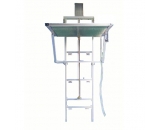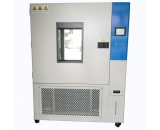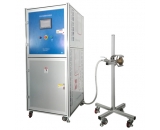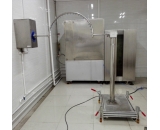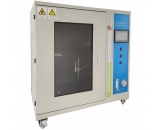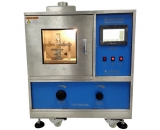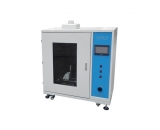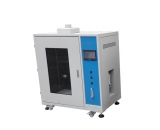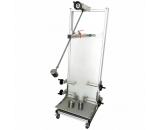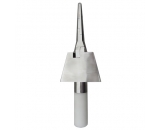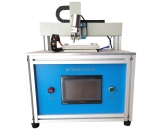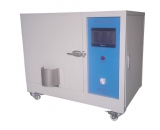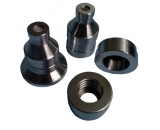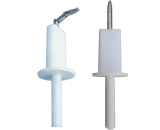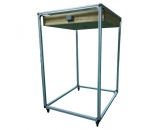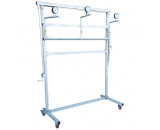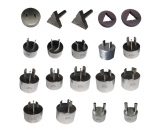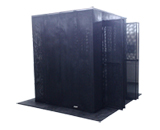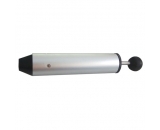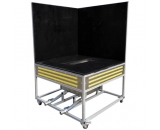16 CFR Part 1200在消费品安全法案下对儿童产品的定义
美国CPSC在今年10月发布了对儿童产品定义的解释性文件16 CFR Part 1200在消费品安全法案下对儿童产品的定义下面是自己翻译的内容哦,有些翻译的不太好,请多指教。
PART 1200
DEFINITION OF CHILDREN'S PRODUCT UNDER THE CONSUMER PRODUCT SAFETY ACT
第1200部分--在消费品安全法案下对儿童产品的定义
Sec.
1200.1 Purpose. 目的
1200.2 Definition of children's product. 儿童产品的定义
---------------------------------------------------------------------------
Sec. 1200.1 Purpose. 目的
This part provides guidance on the definition of children's product and the factors the Commission will consider when making determinations regarding children's products as set forth under 15 U.S.C. 2052(2).
这一部分对在儿童产品的定义和当委员会按照15 U.S.C. 2052(2).的要求对于判定儿童产品时将考虑的因素提供指导。
Sec. 1200.2 Definition of children's product. 儿童产品的定义。
(a) Definition of “Children's Product”— (a)儿童产品的定义
(1) Under section 3(a)(2) of the Consumer Product Safety Act (CPSA), a children's product means a consumer product designed or intended primarily for children 12 years of age or younger. The term “designed or intended primarily” applies to those consumer products mainly for children 12 years old or younger. Whether a product is primarily intended for children 12 years of age or younger is determined by considering the four specified statutory factors. These factors are:
(1)在消费品安全法案(CPSA)第3部分(a) (2),“儿童产品”指主要为不超过12岁的儿童使用而设计的消费产品。 术语“designed or intended primarily” 适用于那些主要为不超过12岁的儿童使用的消费品。 产品是否主要供不超过12岁的儿童使用取决于考虑四个指定的法定因素。 这些因素是:
A statement by a manufacturer about the intended use of such product, including a label on such product if such statement is reasonable.制造商关于产品用途的声明(如果该声明具有合理性),包括产品上的标识。
Whether the product is represented in its packaging, display, promotion, or advertising as appropriate for use by children 12 years of age or younger.产品在包装、展示、促销或广告等方面是否表明该产品适合不超过12岁的儿童使用。
Whether the product is commonly recognized by consumers as being intended for use by a child 12 years of age or younger.消费者是否普遍认为该产品适合不超过12岁的儿童使用。
The Age Determination Guidelines issued by the Commission staff in September 2002 and any successor to such guidelines.委员会工作人员于2002年9月发布的《年龄划分指南》以及后来发布的类似指南。
(2) The examples discussed herein may also be illustrative in making such determinations; however, the determination of whether a product meets the definition of a children's product depends on factual information that may be unique to each product and, therefore, would need to be made on a case-by-case basis. The term “for use” by children 12 years or younger generally means that children will physically interact with such products based on the reasonably foreseeable use of such product. Toys and articles that are subject to the small parts regulations at 16 CFR Part 1501 and in ASTM F963 would fall within the definition of children's product since they are intended for children 12 years of age or younger. Toys and other articles intended for children up to 96 months (8 years old) that are subject to the requirements at 16 CFR 1500.48 through 1500.49 and 16 CFR 1500.50 through 1500.53 would similarly fall within the definition of children's product given their age grading for these other regulations. Therefore, a manufacturer could reasonably conclude on the basis of the age grading for these other regulations that its product also must comply with all requirements applicable to children's products including, but not limited to, those under the Federal Hazardous Substances Act, ASTM F963, “Standard Consumer Safety Specification for Toy Safety,” and the Consumer Product Safety Improvement Act of 2008.
(2)这里被谈论的例子也是在对进行这样的判定进行说明; 然而,判断产品是否符合儿童产品的定义取决于对每个产品都是独特的实际信息,因此,需要根据具体情况进行。术语“for use”主要为不超过12岁的儿童使用通常意味着,根据产品的合理地可预见用途,儿童将与这件产品身体上互动。符合16 CFR第1501部分和在ASTM F963小物件要求的玩具和物品都在儿童产品范围之内,因为它们设计用途是为不超过12岁的儿童使用。符合16 CFR 1500.48-1500.49部分和16 CFR 1500.50至1500.53要求,按照这些其他的规定进行年龄分组的,设计用途是为96个月8岁以上的儿童使用的玩具和物品同样在儿童产品范围之内。所以,制造商可以合理地根据这些其他规定中的年龄分级判断他的产品必须也符合所有可适用对儿童产品的要求,包括但不限于,那些在联邦危害物质法案范围内, ASTM F963, “消费者安全标准-对玩具安全的要求”和消费品安全改善法案2008。
(b) Definition of “General Use Product”--(1) A general use product means a consumer product that is not designed or intended primarily for use by children 12 years old or younger. General use products are those consumer products designed or intended primarily for consumers older than age 12. Some products may be designed or intended for use by consumers of all ages, including children 12 years old or younger, but are intended mainly for consumers older than 12 years of age. Examples of general use products may include products with which a child would not likely interact, or products with which consumers older than 12 would be as likely, or more likely to interact. Products used by children 12 years of age or younger that have a declining appeal for teenagers are likely to be considered children's products.
b) “一般用途产品”的定义--(1)一个一般用途产品意味没有被设计也没有预期主要供为不超过12岁的儿童使用一种消费品。 一般用途产品是那些主要设计或打算供12岁以上消费者使用的消费品。 有些产品可以被设计或预期供所有年龄的消费者使用,包括儿童12岁或更加年轻的,但是主要预期是为了大于12岁的消费者。 一般用途产品的例子可以包括儿童可能不喜欢互动的产品,或大于12岁消费者可能喜欢或更喜欢互动的产品。不超过12岁儿童使用的产品有一种青少年不喜欢的外观,更加可能被认为是儿童的产品。
(2) Other products are specifically not intended for children 12 years of age or younger. These products, such as cigarette lighters, candles, and fireworks, which the Commission has traditionally warned adults to keep away from children, are not subject to the CPSIA's lead limits, tracking label requirement, and third-party testing and certification provisions. Similarly, products that incorporate performance requirements for child resistance are not children's products as they are designed specifically to ensure that children cannot access the contents. This would include products such as portable gasoline containers and special packaging under the Poison Prevention Packaging Act.
(2)其他产品没有具体预期为不超过12岁的儿童。 这些产品,例如香烟,打火机,蜡烛和烟花,委员会传统上警告成人远离儿童,不需要符合CPSIA的铅含量要求,追溯标签要求和第三方测试和证明规定。 同样,包含防儿童开启装置的性能要求的产品不是儿童产品,因为他们明确地被设计保证儿童不可能接近内部。 这将包括产品例如便携式的汽油容器和符合预防毒品包装的法案要求的特别包装。
(c) Factors Considered--To determine whether a consumer product is primarily intended for a child 12 years of age or younger the four specified statutory factors must be considered together as a whole. The following four factors must be considered:
(c) 考虑的因素--要确定消费品是否主要供不超过12岁儿童,四个指定法定因素必须整体上一起考虑。以下四个因素必须考虑:
(1) A statement by a manufacturer about the intended use of such product, including a label on such product if such statement is reasonable. A manufacturer's statement about the product's intended use, including the product's label, should be reasonably consistent with the expected use patterns for a product. A manufacturer's statement that the product is not intended for children does not preclude a product from being regulated as a children's product if the primary appeal of the product is to children 12 years of age or younger, as indicated, for example, by decorations or embellishments that invite use by the child, being sized for a child or being marketed to appeal primarily to children. Similarly, a label indicating that a product is for ages 9 and up does not necessarily make it a children's product if it is a general use product. Such a label may recommend 9 years old as the earliest age for a prospective user, but may or may not indicate the age for which the product is primarily intended. The manufacturer's label, in and of itself, is not considered to be determinative.
1) 制造商关于产品用途的声明(如果该声明具有合理性),包括产品上的标识。关于产品的设计用途的制造商的声明,包括产品的标签,应该与产品的期望用途模式合理地一致。 在制造商的声明中产品没有预期供儿童使用不妨碍一个产品当作儿童产品,如果产品显示出的主要吸引力是给不超过12岁的儿童,例如,用于装饰或点缀引诱儿童的,儿童尺寸的,或被主要吸引儿童进行销售的。 同样,如果它是一个一般用途产品,标签显示产品是产品为9岁以上,不一定使它成为儿童产品。 这件标签可以推荐9岁作为一名预期用户的最早年龄,但是可能或者可能不表明产品主要预期的年龄。 制造商的标签,就其本身,不认为有决定的意义。
(2) Whether the product is represented in its packaging, display, promotion, or advertising as appropriate for use by children 12 years of age or younger.
(2) 产品在包装、展示、促销或广告等方面是否表明该产品适合不超过12岁的儿童使用。
(i) These representations may be express or implied. For example, advertising by the manufacturer expressly declaring that the product is intended for children 12 years of age or younger will support a determination that a product is a children's product. While, for example advertising by the manufacturer showing children 12 years of age or younger using the product may support a determination that the product is a children's product. These representations may be found in packaging, text, illustrations and/or photographs depicting consumers using the product, instructions, assembly manuals, or advertising media used to market the product.
(i)这些表示可以是明确的或暗示。 例如,做广告的制造商明确地宣称产品供儿童使用不超过12岁将支持判断产品是儿童产品。 当,例如制造商的做广告显示不超过12岁的儿童在使用产品可以支持判断时产品是儿童产品。 这些表示法在包装,文字,描述消费者使用产品的图示和照片,说明书,组装说明,销售产品使用的广告媒体中找到。
(ii) The product's physical location near, or visual association with, children's products may be a factor in making an age determination, but is not determinative. For example, a product displayed in a children's toy section of a store may support a determination that the product is a children's product. However, where that same product is also sold in department stores and marketed for general use, further evaluation would be necessary. The Commission recognizes that manufacturers do not necessarily control where a product will be placed in a retail establishment and such lack of control will be considered. The Commission evaluates products more broadly than on a shelf-by-shelf or store-by-store basis.
ii)产品的实际位置靠近或者视觉上联系着儿童产品可以是进行年龄判断的一个因素,但是不是决定的。 例如,在商店的儿童的玩具部分展示的产品可以支持判断产品是儿童产品。 然而,当同样产品在百货商店也被卖并且为一般用途被销售,则进一步评估是必要的。 委员会认为制造商不一定需要控制产品在零售店所放置的位置,并且这种控制的缺乏将被考虑。 委员会会在比货架间或店铺间更为广泛的范围内评估产品。
(iii) The product's association or marketing in conjunction with nonchildren's products may not be determinative as to whether the product is a children's product. For example, packaging and selling a stuffed animal with a candle would not preclude a determination that the stuffed animal is a children's product since stuffed animals are commonly recognized as being primarily intended for children.
(iii)与非儿童的产品结合在一起或一起销售的产品可能不是能决定的是否产品是儿童产品。例如,和一个蜡烛包装在一起销售的一件填充动物玩偶不会妨碍判断填充动物玩偶是儿童产品,因为填充动物玩偶普遍地被认为是主要供儿童使用。
(3) Whether the product is commonly recognized by consumers as being intended for use by children 12 years of age or younger. Consumer perception of the product's use by children, including its reasonably foreseeable use, will be evaluated. Sales data, market analyses, focus group testing, and other marketing studies may help support an analysis regarding this factor.
(3) 消费者是否普遍认为该产品适合不超过12岁的儿童使用。消费者对于产品由儿童的使用的感知,包括它合理地可预见的用途,将被评估。 销售数据、市场分析、聚焦群测试和其他市场调查可以帮助支持关于这个因素的分析。
(i) Features and Characteristics--additional considerations that may help distinguish children's products from nonchildren's products include:
(i)特点和特征—额外的考虑可以帮助区别儿童产品与非儿童产品,包括:
Small sizes that would not be comfortable for the average adult;
平均来说成人不会舒适的小尺寸;
Exaggerated features (large buttons, bright indicators) that simplify the product's use;
简化产品用途的被夸大的特点(大按钮,明亮的显示);
Safety features that are not found on similar products intended for adults;
在预期为成人相似的产品找不到的安全特点;
Colors commonly associated with childhood (pinks, blues, bright primary colors);
一般与儿童时期有联系的颜色(桃红色、蓝色,明亮的原色);
Decorative motifs commonly associated with childhood (such as animals, insects, small vehicles, alphabets, dolls, clowns, and puppets);
一般与儿童时期有联系的装饰图案 (例如动物、昆虫、小车、字母表、玩偶、小丑和木偶);
Features that do not enhance the product's utility (such as cartoons) but contribute to its attractiveness to children 12 years of age or younger; and
产品的特点不提高产品的功能(例如动画片),但是对于提高对不超过12岁儿童的吸引力有作用; 并且
Play value, i.e., features primarily attractive to children 12 years of age or younger that promote interactive exploration and imagination for fanciful purposes (whimsical activities lacking utility for accomplishing mundane tasks; actions performed for entertainment and amusement).
具有玩耍价值,即,特点主要吸引对不超过12岁儿童促进交互式的探索和想象的幻想目的 (异想天开的活动,缺乏完成平淡的任务的功能; 为表演和娱乐进行的活动)。
(ii) Principal use of the product--the principal uses of a product take precedence over other actions that are less likely to be performed with a product. For example, when a child pretends that a broom is a horse, that does not mean the item is a children's product because the broom's principal use is for sweeping;
(ii)对产品的基本用途--对产品的基本用途优先于是很少可能用产品进行的活动。 例如,当儿童假装时笤帚是马,不意味这个产品就是儿童产品,因为笤帚的基本用途是为清扫;
(iii) Cost--the cost of a given product may influence the determination of the age of intended users; and
(iii) 成本--一个给定产品的成本可以影响对预期用户年龄的判断; 并且
(iv) Children's interactions, if any, with the product--products for use in a child's environment by the caregiver but not for use by the child would not be considered to be primarily intended for a child 12 years of age or younger.
(iv)儿童的交互作用,若有,使用产品—在儿童的环境,由儿童的护理人而不是儿童使用的产品,不会被认为主要供不超过12岁儿童使用。
(4) The Age Determination Guidelines issued by the Consumer Product Safety Commission staff in September 2002, and any successor to such guidelines. The product's appeal to different age groups and the capabilities of those age groups may be considered when making determinations about the appropriate user groups for products.
(4) 委员会工作人员于2002年9月发布的《年龄划分指南》以及后来发布的类似指南。在判断产品适用的年龄组时,产品吸引不同的年龄组和那些年龄组的能力可以被考虑。
(d) Examples--To help manufacturers understand what constitutes a children's product under the CPSA, the following additional examples regarding specific product categories are offered:
(d)例子--要帮助制造商明白在CPSA范围内什么构成一个儿童产品,我们对于具体的产品类别提供下列各项例子:
(1) Furnishings and Fixtures--General home furnishings and fixtures (including, but not limited to: Rocking chairs, shelving units, televisions, digital music players, ceiling fans, humidifiers, air purifiers, window curtains, tissue boxes, rugs, carpets, lamps, clothing hooks and racks) that often are found in children's rooms or schools would not be considered children's products unless they are decorated or embellished with a childish theme and invite use by a child 12 years of age or younger, are sized for a child, or are marketed to appeal primarily to children. Examples of home or school furnishings that are designed or intended primarily for use by children and considered children's products include: Infant tubs, bath seats, small bean bag chairs with childish decorations, beds with children's themes, child-sized desks, and child-sized chairs. Decorative items, such as holiday decorations and household seasonal items that are intended only for display, with which children are not likely to interact, are generally not considered children's products, since they are intended to be used by adults.
(1)陈设品和装置--一般家饰和装置 (包括但不限于:摇椅、架子、电视、数字式音乐播放器、吊扇、润湿器、空气净化器、窗帘、衣物箱、地毡、地毯、灯、衣帽勾和衣架),在儿童居室或学校经常被找到但不会被认为是儿童产品除非他们是装饰或美好的主题和和邀请不超过12岁的儿童使用,产品是儿童尺寸或者主要为吸引儿童进行销售。 举例来说,被设计或预期主要供儿童使用和被认为是儿童产品的家庭或学校陈设品包括:婴儿木盆,浴椅,有幼稚装饰的小辎重袋椅子,有儿童主题的床,儿童尺寸的书桌,儿童尺寸的椅子。装饰项目,例如预期为展示预期,儿童不可能互动的假日装饰和家庭季节性项目,通常不被认为是儿童产品,因为他们预期由成人使用。
(2) Collectibles--Adult collectibles may be distinguished from children's collectibles by themes that are inappropriate for children 12 years of age or younger, have features that preclude use by children during play, such as high cost, limited production, fragile features, display features (such as hooks or pedestals), and are not marketed alongside children's products (for example, in a children's department) in ways that make them indistinguishable from children's products. For example, collectible plush bears have high cost, are highly detailed, with fragile accessories, display cases, and platforms on which to pose and hold the bears. Children's bears have lower costs and simple accessories that can be handled without fear of damage to the product. Another example of collectible items includes model railways and trains made for hobbyists.
(2) 收藏品--成人的收藏品可以与儿童的收藏品在主题上进行区别,他们不适宜于不超过12岁的儿童,有防止儿童在玩耍期间使用的特点,如高成本,产量有限,易碎的特点,用于展示的特点(例如钩子或底座)和没有与儿童产品一起被销售(例如,在儿童用品部)用这种方式与儿童产品进行区分。 例如,可可收藏的长毛绒熊有高价格,是高度复杂的,有易碎的附件,陈列橱和平台摆放姿势和容纳熊的。 儿童的熊被处理成对产品没有恐惧或伤害的低成本的简单的附件。 收藏项目的另一个例子包括为有爱好者制作的铁路和火车。
(3) Jewelry--Jewelry intended for children is generally sized, themed, and marketed to children. The following characteristics may cause a piece of jewelry to be considered a children's product: Size; very low cost; play value; childish themes on the jewelry; sale with children's products (such as a child's dress); sale with a child's book, a toy, or party favors; sale with children's cereal or snacks; sale at an entertainment or educational event attended primarily by children; sale in a store that contains mostly children's products; and sale in a vending machine. In addition, many aspects of an item's design and marketing are considered when determining the age of consumers for whom the product is intended and will be purchased including: Advertising; promotional materials; packaging graphics and text; dexterity requirements for wearing; appearance (coloring, textures, materials, design themes, licensing, and level of realism); and cost. These characteristics will help jewelry manufacturers and consumers determine whether a particular piece of jewelry is designed or intended primarily for children 12 years of age or younger.
(3)首饰—预期供儿童使用的首饰是通常尺寸,有特定主题的,并且被销售给儿童。 以下特征可以造成一件首饰被认为是儿童产品: 大小; 非常低成本; 玩耍价值; 用于首饰的儿童题材; 与儿童产品一起销售(例如儿童的服装); 与儿童图书、玩具或者聚会喜好品一起销售; 与儿童的麦片或快餐一起销售; 在主要由儿童出席的娱乐或教育事件中销售; 在主要包含儿童产品的商店销售; 和在自动售货机销售。 另外,当确定预期的和购买产品的消费者的年龄时,项目设计和行销的许多方面将被考虑: 广告; 促销材料; 包装的图示和文字; 穿戴的灵巧要求; 外观(着色、纹理、材料,设计题材,专利和现实程度); 及价格。 这些特征将帮助首饰制造商和消费者确定一件特定的首饰是否主要为不超过12岁儿童设计或预期使用。
(4) DVDs, Video Games, and Computer Products--Most computer products and electronic media, such as CDs, DVDs, and video games, are considered general use products. However, CDs and DVDs with encoded content that is intended for and marketed to children, such as children's movies, games, or educational software may be determined to be children's products. CPSC staff may consider ratings given by entertainment industries and software rating systems when making an age determination. In addition, electronic media players and devices that are embellished or decorated with childish themes that are intended to attract children 12 years of age or younger, are sized for children, or are marketed to appeal primarily to children, are not likely to fall under the general use category where children 12 years or younger likely would be the primary users of such devices. However, electronic devices such as CD players, DVD players, game consoles, book readers, digital media players, cell phones, digital assistant communication devices, and accessories to such devices that are intended mainly for children older than 12 years of age or adults are products for general use.
(4) DVD、电子游戏和计算机产品--多数计算机产品和电子媒介,例如CD, DVD和电子游戏,被认为一般用途产品。 然而,预期供儿童使用,并且向儿童销售的有编码内容的CD和DVD可以判定为儿童产品,例如儿童电影,游戏或者教育性软件。 当CPSC做年龄判断时,可以考虑娱乐业和软件评估系统提供的分级。另外,用儿童题材美化或装饰预期吸引不超过12岁的儿童,儿童尺寸,或者主要吸引儿童进行销售的电子游戏机和设备,当不超过12岁的儿童为这种设备的主要用户时就不可能属于一般用途的类别。然而,电子设备例如光盘播放机, DVD机、游戏控制台、阅读器、数字式播放装置、手机、数字式辅助通信设备,和对主要预期为大于12岁儿童使用的通信设备的辅助是一般用途的产品。
(5) Art Materials--Materials sized, decorated, and marketed to children 12 years of age or younger, such as crayons, finger paints, and modeling dough, would be considered children's products. Crafting kits and supplies that are not specifically marketed to children 12 years of age or younger likely would be considered products intended for general use. Consideration of the marketing and labeling of raw materials and art tools (such as modeling clay, paint, and paint brushes) may often be given high priority in an age determination because the appeal and utility of these raw materials has such a wide audience. If a distributor or retailer sells or rents a general use product in bulk (such as a raw art materials or art tools) through distribution channels that target children 12 years of age or younger in educational settings, such as schools, summer camps, or child care facilities, this type of a distribution strategy would not necessarily convert a general use product into a children's product. However, if the product is packaged in such a manner that either expressly states or implies with graphics, themes, labeling, or instructions that the product is designed or intended primarily for children 12 years of age or younger, then it may be considered a children's product if the required consideration of all four statutory factors supports that determination. The requirements of the Labeling of Hazardous Art Materials Act are similar to the labeling requirements of the FHSA, of which it is a part. Therefore, third party testing to LHAMA is not required. An art material designed or intended primarily for children 12 years of age or younger would have to be tested by a third party laboratory to demonstrate compliance with CPSIA, but it would not require third party testing and certification to the LHAMA requirements. For the same reasons, no general conformity certificate is required for general use art materials.
5)艺术材料--对于向不超过12岁的儿童尺寸大小,装饰和销售的产品,例如蜡笔,手指油漆和造型粘土,将被认为儿童的产品。不特定地被销售给不超过12岁儿童可能的成套工具和补充件将被认为是预期为一般用途的产品。对原材料和艺术工具(例如雕塑黏土、油漆和画笔)的市场和标识的考虑可以经常在年龄判断上有特别优先权,因为这些原材料的外观和功能有非常广泛的观众。 如果经销商或零售商通过分销渠道批量出售或者出租一个一般用途产品 (例如未加工的艺术材料或艺术工具),目标是在教育设置中不超过12岁的儿童,例如学校、夏令营或者育儿设施,此种分销战略不一定将一个一般用途产品转换成儿童产品。然而,如果产品被用图示,主题,标识,或者说明书的方式包装成明确地声明或暗示产品主要为不超过12岁儿童设计或预期使用,如果所有被要求考虑的四项法定因素支持判定的结果,那么它将被认为是儿童产品。 危害艺术材料法案的标记要求类似FHSA的标记要求,它是其中的一部分。 所以,没有要求进行对LHAMA的第三方测试。设计和预期主要供不超过12岁儿童使用的艺术材料将必须由第三方实验室测试证明符合CPSIA,但是它不要求由第三方测试和证明符合LHAMA要求。 对于同样原因,对于一般用途艺术材料没有要求提供一般符合证明。
(6) Books--The content of a book can determine its intended audience. Children's books have themes, vocabularies, illustrations, and covers that match the interests and cognitive capabilities of children 12 years of age or younger. The age guidelines provided by librarians, education professionals, and publishers may be dispositive for determining the intended audience. Some children's books have a wide appeal to the general public, and in those instances, further analysis may be necessary to assess who the primary intended audience is based on consideration of relevant additional factors, such as product design, packaging, marketing, and sales data.
(6)书--书的内容可能确定它预期的观众。儿童图书有主题、词汇量、插图,匹配不超过12岁儿童的兴趣和认知能力的封面。 图书管理员、教育专家和出版者提供的年龄指南可以为确定预期的读者具有决定性作用。有些儿童图书对公众有一个广泛的吸引力,并且在那些案例中,基于相关的其他因素的考虑对于评估谁是主要预期的读者进行进一步的分析是很有必要的,例如产品设计,包装,销售和销售数据。
(7) Science Equipment--Microscopes, telescopes, and other scientific equipment that would be used by an adult, as well as a child, are considered general use products. Equipment that is intended by the manufacturer for use primarily by adults, although there may be use by children through such programs, is a general use product. Toy versions of such items are considered children's products. If a distributor or retailer sells or rents a general use product in bulk through distribution channels that target children 12 years of age or younger in educational settings, such as schools or summer camps, this type of a distribution strategy would not necessarily convert a general use product into a children's product. However, if the product is packaged in such a manner that either expressly states or implies with graphics, themes, labeling, or instructions that the product is designed or intended primarily for children 12 years of age or younger, then it may be considered a children's product if the required consideration of all four statutory factors supports that determination. Products mainly intended for use by the instructor would not be considered children's products. In general, scientific equipment that is specifically sized for children, such as protective gear, eyewear, gloves, or aprons and/or has childish themes or decorations and invites use by a child 12 years of age or younger or is marketed to appeal primarily to children is considered a children's product.
(7)科学设备--显微镜、望远镜和由成人使用(也包括儿童)的其他科学设备,被认为是一般用途的产品。制造商预期为使用主要由成人的设备,虽然可以在一些节目中由儿童使用,是一个一般用途产品。这种产品的玩具版本被认为是儿童产品。如果经销商或零售商通过分销渠道批量出售或者出租一个一般用途产品,目标是在教育设置中不超过12岁的儿童,例如学校、夏令营,此种分销战略不一定将一个一般用途产品转换成儿童产品。然而,如果产品被用图示,主题,标识,或者说明书的方式包装成明确地声明或暗示产品主要为不超过12岁儿童设计或预期使用,如果所有被要求考虑的四项法定因素支持判定的结果,那么它将被认为是儿童产品。产品主要预期供辅导员使用不会被认为是儿童产品。 一般来说,具有儿童特定尺寸,例如防护装置,眼镜,手套或者围裙和/或有儿童题材或装饰并且吸引不超过12岁儿童使用或者主要为吸引儿童进行销售的科学设备被认为儿童产品。
(8) Sporting Goods and Recreational Equipment--Sporting goods that are intended primarily for consumers older than 12 years of age are considered general use items. Sporting equipment, sized for adults, are general use items even though some children 12 years of age or younger will use them. Unless such items are specifically marketed to children 12 years of age or younger, or have extra features that make them more suitable for children 12 years of age or younger than for adults, they would be considered general use products. If children 12 years or younger would mainly use the product because it would be too small or inappropriate for older children to use, then it likely would be considered a children's product. Likewise, recreational equipment, such as roller blades, skateboards, bicycles, camping gear, and fitness equipment are considered general use products unless they are sized to fit children 12 years of age or younger and/or are decorated with childish features by the manufacturer.
8)体育用品和娱乐设备--主要为大于12岁的消费者预期使用的体育用品被认为一般用途的产品。 运动器材,成人尺寸的,是一般用途的产品,即使有些不超过12岁的儿童将使用它们。 除非这件产品明确地被销售给不超过12岁儿童或者有使它们比对于成人来说更适用于不超过12岁的儿童的额外特点,它们将被认为一般用途的产品。 如果不超过12岁的儿童会主要使用产品,因为它是太小的或不适于较大儿童使用,则可能将被认为儿童产品。 同样,娱乐设备,除非他们尺寸适合不超过12岁儿童并且/或者被用制造商儿童特点进行装饰,例如直排轮式溜冰鞋,滑板、自行车、野营装备和健身设备被认为一般用途的产品。
(9) Musical Instruments--Musical instruments, including electronically-aided instruments suited for an adult musician, are general use products. Instruments intended primarily for children can be distinguished from adult instruments by their size and marketing themes. The Commission notes that if a distributor or retailer sells or rents in bulk, a general use musical instrument through distribution channels that target children 12 years of age or younger in educational settings, such as schools or summer camps, this type of a distribution strategy would not necessarily convert a general use product into a children's product. However, if the product is packaged in such a manner that either expressly states or implies with graphics, themes, labeling, or instructions that the product is designed or intended primarily for children 12 years of age or younger, then it may be considered a children's product if the required consideration of all four statutory factors supports that determination.
(9)乐器--乐器,包括于适合一位成人音乐家的电子辅助的仪器,是一般用途产品。 主要预期供儿童使用的乐器可以从尺寸和销售主题上与成人乐器进行区别。 委员会说明,如果经销商或零售商通过分销渠道批量出售或者出租一个一般用途乐器,目标是在教育设置中不超过12岁的儿童,例如学校、夏令营,此种分销战略不一定将一个一般用途产品转换成儿童产品。然而,如果产品被用图示,主题,标识,或者说明书的方式包装成明确地声明或暗示产品主要为不超过12岁儿童设计或预期使用,如果所有被要求考虑的四项法定因素支持判定的结果,那么它将被认为是儿童产品。
Dated: October 6, 2010.Todd A. Stevenson,Secretary, Consumer Product Safety Commission.
BILLING CODE 6355-01-P 原文如下 谢谢楼主。W是个新手,威望不高,想要个全文参考下,望楼主支持下,谢谢哈。 支持!帮顶,谢谢楼主! 收下了 楼主很不错,顶一个 有用的资料,谢谢楼主!
页:
[1]
